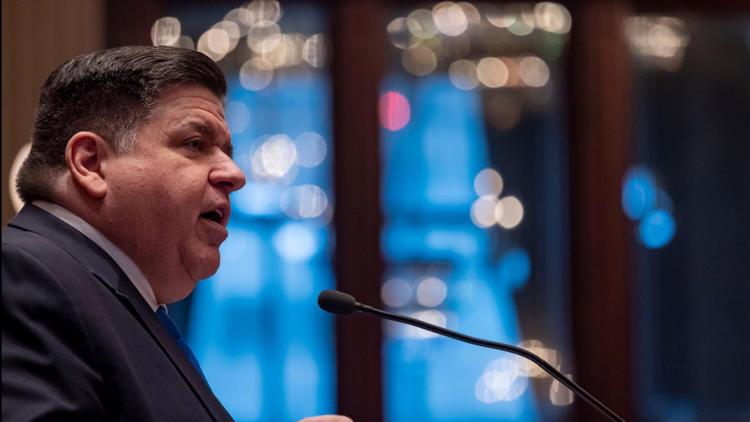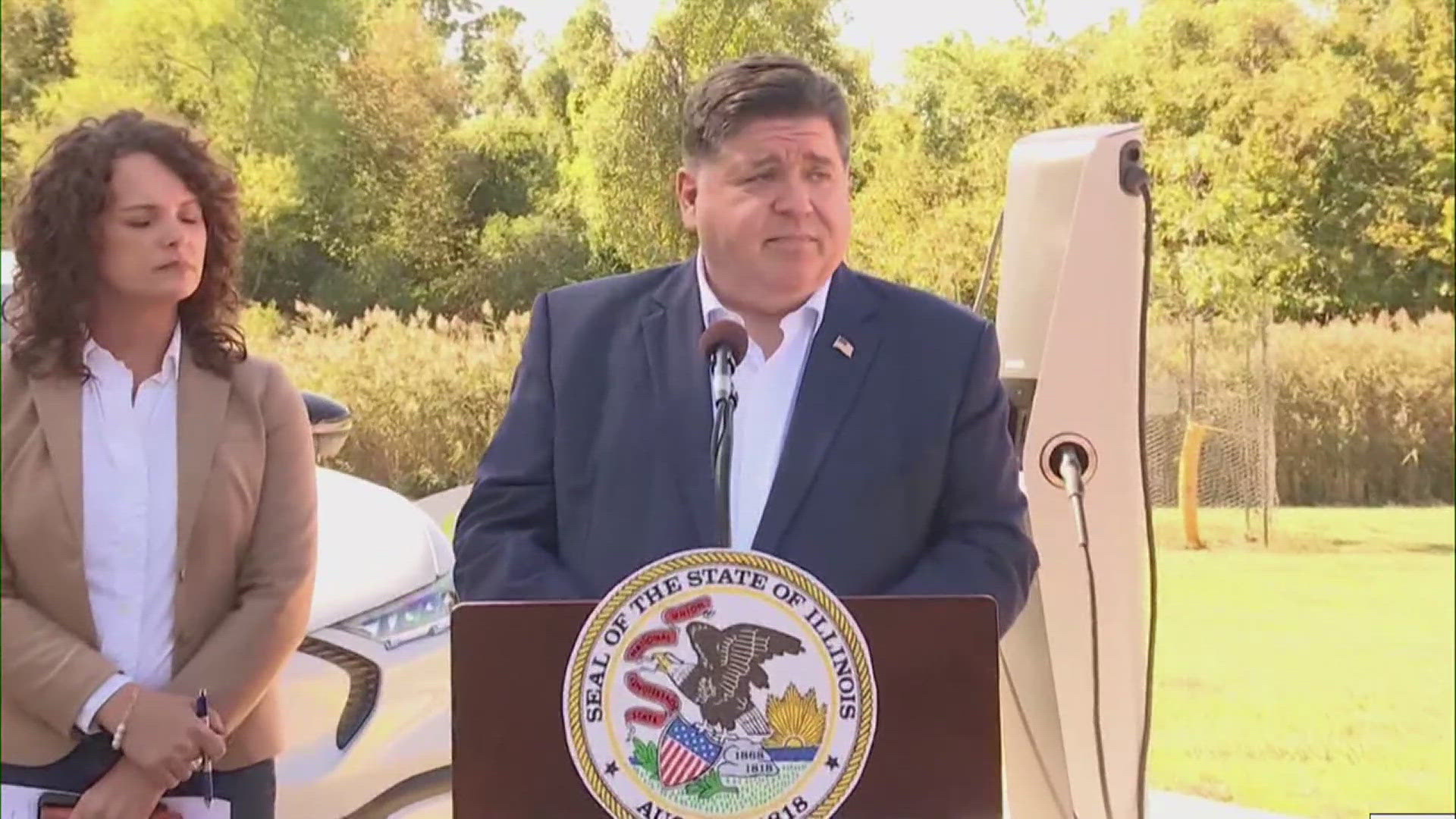SPRINGFIELD, Ill. — UPDATE: The budget was filed as a 3,409-page amendment to Senate Bill 250 late Wednesday evening. This story has been updated to reflect the latest developments as of Wednesday night.
Gov. JB Pritzker and Democratic leaders announced Wednesday they’ve agreed to a framework for next year’s roughly $50 billion state spending plan, even as negotiations continued in the final stretch of lawmakers’ already-extended spring legislative session.
Their announced agreement included only a two-page summary of topline spending numbers in five stated areas – fiscal responsibility, education, fighting poverty, health and human services and economic development. The rest would be included in a series of budget bills that had not been filed as of early Wednesday evening.
Even with details lacking, Pritzker, House Speaker Emanuel “Chris” Welch and Senate President Don Harmon proclaimed unity as they faced reporter questions on the budget for the first time during the final stretch of negotiations on Wednesday afternoon.
“Democrats have done the work to earn our state eight credit upgrades,” Welch said Wednesday. “And all three of us standing here today made the same commitment heading into these budget negotiations...we will continue putting Illinois down a path toward fiscal stability when this budget is signed into law.”
Harmon said he hoped the Senate would pass budget legislation to the House on Wednesday night so the House could take a final vote on Friday due to a constitutional requirement that bills be read in the chamber three times on three separate days. But the Senate adjourned without doing so, meaning session would be extended through at least Saturday.
“The Senate did file a budget earlier this evening,” Harmon said, referring to his 3,409-page amendment to Senate Bill 250. “Our agreement with the House and the governor was to not act on that proposed budget until we had agreement with both the House and the governor. The House (Democrats are) in caucus now as I understand it. We are eagerly awaiting their final input into the budget.”
Members of the House said late Wednesday that they were still reviewing the amendment and they had been polled as to whether they would prefer to work through Saturday or return Tuesday to finalize the plan.
“I don't think people want to come back Tuesday,” Rep. Jaime Andrade, D-Chicago, told Capitol News Illinois after leaving the House Democrats’ late-night caucus. “I think they'll find a way, that things have always worked out, and I think that Saturday should be – that's my feel. I think mostly people are happy. I think people are very happy that (the budget process has) actually slowed down a little bit.”
Andrade pointed out that representatives were repeatedly warned, “do not make any plans until June 1” and said Statehouse veterans shouldn’t have believed the original adjournment date of May 19th was realistic – unless the budget was “shoved...down everyone’s throat.”
As for the agreement announced earlier Wednesday, the trio of top Democrats was especially short on details when pressed on how the state would manage the biggest unforeseen cost facing lawmakers: a still-growing program that grants Medicaid-type health care coverage to noncitizens ages 42 and over. The governor’s office recently estimated the program would cost $1.1 billion in the upcoming fiscal year, or five times more than he had initially budgeted.
“The Senate and the House have agreed to give us the tools to manage the program properly so that it doesn't reach a ($1.1 billion) proportion ... and instead allows us to provide health care for the people who are on the program now and make sure that we're continuing the program going forward, but in a budget friendly way so that everybody gets the health care that they deserve,” Pritzker said.
His office said those options include limiting future enrollment in the program, requiring copays, maximizing federal reimbursement and a possible move to managed care.
“By using these tools, Gov. Pritzker is confident we’ll be able to responsibly manage this program and preserve healthcare for more than 50,000 people who are already a part of the program,” Alex Gough, a spokesperson for the governor, said in a statement.
The budget pressure created by the noncitizen health care program coincided with requests by several health care advocacy groups. Hospitals have asked for an increase to Medicaid reimbursement rates of up to 20 percent, and providers of care for individuals with developmental disabilities had sought a $4 hourly wage increase.
“Suffice to say that there are Medicaid reimbursement increases,” Pritzker said. “Not as much as everybody has asked for, but it's a big sum.”
The two-page summary indicated the budget would include over $200 million to improve services for Illinoisans with developmental disabilities and another $24 million to increase reimbursement rates for home workers who assist the elderly.
The Illinois Association of Rehabilitation Facilities, a trade group for homes serving disabled individuals, had sought the $4 per hour increase for direct service professionals. The state currently pays a $17 hourly flat rate to providers, although some DSPs are ultimately paid more – or less. IARF issued a news release saying the governor’s plan only accounted for a $2 increase, a 50-cent increase from the governor’s initial February proposal.
“We regretfully must oppose this and any other state budget proposal that includes a proposed wage structure for our frontline workers that will not meet their needs and leave our workforce crisis intact,” IARF president and CEO Josh Evans said in a statement.
IARF said the wage increase was needed to make direct service professional pay competitive with restaurant and retail work. The industry needs adequate staff to be able to reduce the waitlist of 15,000 people seeking state-funded care, Evans said.
The announced budget plan also calls for a $75 million increase in the Department of Children and Family Services’ budget to hire 192 new staff, expand training and protection, increase scholarships for youth in care and improve facilities.
The governor’s office did not provide a total revenue estimate or spending figure, although Pritzker said it would be close to the $50.4 billion number that was last cited by the Governor’s Office of Management and Budget earlier this month.
At one point during the spring session, the legislature’s fiscal forecaster – the Commission on Government Forecasting and Accountability – had predicted a vast surplus for the current fiscal year that had the governor and legislative leaders discussing tax cuts. But that projected surplus evaporated when April revenues came in about $1.8 billion below the previous fiscal year.
GOMB decreased its current-year revenue estimate earlier this month by $616 million, although they also increased next year’s estimate by $532 million. While those developments essentially ended the talk of tax cuts, they didn’t drastically alter the landscape of Pritzker’s February proposal, which relied on a more conservative estimate than COGFA.
As a result, the deal announced by top Democrats Wednesday afternoon included many of the spending priorities outlined in Pritzker’s February proposal. That included a $350 million increase to the K-12 education funding formula, a $200 million pension payment beyond what is required by law, a $100 million increase in college and university funding, and a $100 million increase for Monetary Award Program grant funding for college scholarships.
The agreement, according to the governor’s office, would also include the $250 million to fund his “Smart Start” early childhood education plan, a backbone of his February budget proposal. That includes increased funding for child care workforce compensation, early childhood block grants, early intervention programs and home visits.
In February, the governor proposed $100 million in general revenue funds for capital developments at early childhood centers, a spending amount that has decreased to $50 million under the new agreement.
In another apparent downward adjustment, a $70 million three-year teacher pipeline program proposed in February would now receive $45 million.
The governor’s office also noted that Home Illinois – the governor’s plan for addressing homelessness – would still see “more than $350 million” in state funding, the same number quoted in Pritzker’s February proposal.
The announced agreement also includes a $20 million grant program to incentivize the expansion or building of grocery stores in food deserts – an issue pervasive in both rural and urban areas of the state. A bill directing the state’s Department of Commerce and Economic Opportunity to create the grant program, dubbed the “Grocery Initiative,” received final approval from the Senate on Wednesday, passing on a unanimous vote.
Those seeking to launch cannabis businesses through Illinois’ social equity licensure pathway – a program set up to prioritize would-be entrepreneurs from Black and Latino communities – would have a chance for a share of $40 million more in forgivable loans. That figure was unchanged from the governor’s February proposal.
One item missing from the budget framework was the state’s $75 million tax credit program that supports private school scholarships. The Invest in Kids program was established as part of Illinois’ 2017 overhaul of how the state funds public education. It was a priority of Republican then-Gov. Bruce Rauner, a vocal proponent of so-called school choice and frequent critic of public schools.
Pritzker promised to repeal the program during his first run for governor against Rauner in 2018, but during his first legislative session in 2019 he abandoned plans to phase it out in a deal to attract GOP votes for the state’s budget plan. In 2021, he again tried to scale back the program, but dropped the idea. Last year, he even said he was supportive of keeping it.
But the law has a built-in sunset date of Jan. 1, 2024, and on Wednesday Pritzker said the program was “not something…covered by the budget agreement.”
“It’s something that still has time, potentially, but it’s not something that’s in the budget agreement,” he said.
After the news conference, Harmon said he was slated to discuss the plan with Senate Republican Leader John Curran, R-Downers Grove, and he was hopeful it would receive Republican votes in that chamber. A spokesperson for Curran said negotiations were ongoing.
House Republicans have been more critical of the negotiating process, saying they’ve essentially been left out of it.
“Republicans and Democrats have shared priorities and past promises that need to be kept,” House Minority Leader Tony McCombie, R-Savanna, said in a statement.
She said those include extending the Invest in Kids scholarship and a research and development tax credit. Another House GOP priority was phasing out the franchise tax as had initially been planned in 2019 budget negotiations before Democrats backtracked the following fiscal year, and changing the estate tax code.
“Today we learned from Governor Pritzker and Democratic leaders that our shared priorities are not included,” she said.
Watch more news, weather and sports on News 8's YouTube channel
Capitol News Illinois is a nonprofit, nonpartisan news service covering state government. It is distributed to hundreds of print and broadcast outlets statewide. It is funded primarily by the Illinois Press Foundation and the Robert R. McCormick Foundation, along with major contributions from the Illinois Broadcasters Foundation and Southern Illinois Editorial Association.



